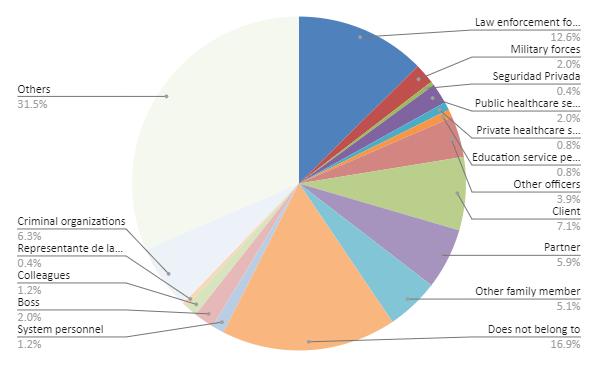
18 minute read
rights
“STOP KILLING US” 2019-2020 REGIONAL REPORT
states deny access to identity, health, employment, education and housing with the excuse of protecting family rights.
Advertisement
“What we see in our region are weak democracies and repressive right-wing governments that have reversed our achievements. We have to engage in debate and work with organizations to confront these governments. We need to strengthen our activism and advocacy.” Marcela Romero, REDLACTRANS Regional Coordinator.
Fundamentalist religious groups, which are organized at all levels, have turned their opposition to agendas based on gender equality theories and movements into their slogans to build power. Their expansion, discriminatory campaigns, and power, including offices taken through elections and strong influence in public policy decisions, increase the risks to which transgender people are exposed.
“Anti-rights groups do not want us to start our families, and we already have our families, our identities, and nobody can take that away from us, we have to make them legal. Those who rule our countries breach the law.” Marcela Romero, REDLACTRANS Regional Coordinator.
As noted in our previous regional report, hate speech leads to dehumanization and discrimination, which pave the way for other kinds of crimes (Inter-American Commission on Human Rights, 2015). Moreover, hate speech leads to the perpetuation of prejudices about transgender people, heightens their vulnerability and stimulates unequal conditions with respect to governments and other sectors.
4.2. State of affairs and human rights violations against transgender rights
This section introduces an analysis on the state of affairs of transgender persons in Latin America and the Caribbean focused on the human rights violations documented by CeDoSTALC in 2019.
As already mentioned, it is a snapshot of trans people status across the region; that is, in the absence of resources and support from governments to generate official statistics, civil society transgender organizations created observatories or documentation centers, such as the CeDoSTALC, to collect accurate information based on the accounts of victims.
Marcela Romero, REDLACTRANS Regional Coordinator, stated: “We need to prepare indicators to change reality; women and trans people want to leave the darkness;
“STOP KILLING US” 2019-2020 REGIONAL REPORT
we don’t want to be on the corners, we want to and it is our right to enjoy the same rights as everyone else.” In this case, and to highlight the damage and brutality with which our bodies are mutilated, we asked our national representatives to summarize the salient hate crimes committed in the countries during this period. This strategy will account for the violations to transgender human rights regarding the right to life and personal integrity, access to justice, health, education and employment.
A. RIGHT TO LIFE
In the region, transgender people are victims of hate crimes, which account for one of the highest death rates without legal consequences for perpetrators. We classified a series of items showing the type of potential relationship with the victim.
This chart shows the categories mentioned; a great number of these categories is referred to as “OTHER” and will appear in the following chart. This category, as described by Transgender Recorders, is based on the lack of government action leading to the deaths of transgender people in 2019 and 2020. “Law enforcement forces” is the second category that most greatly affected the right to trans lives, also related to the institutional violence suffered by trans people across the region.
“STOP KILLING US” 2019-2020 REGIONAL REPORT
The following chart shows the types of violations suffered by the transgender population. A total of 42% of the violations registered in the investigation involve extreme violence; that is, murder, beating and rape. Although this figure may be lower than the amount recorded in previous reports, it may be explained by the fact that 25.3% of perpetrators are listed as “OTHERS.” This evidences the absence of government action as the source of the infringement or violation of human rights, which is fairly similar to the information contained in the previous chart.
There is an increase in the violence suffered by the trans community from the media and justice. As long as there are no proper laws securing the respect and recognition of trans identities, all these hate crimes will not be titled and treated accordingly and will continue to heighten the stigma and discrimination practiced by the remainder social institutions.
Furthermore, more than half (53.5%) of the violent acts take place in the streets or in the areas concentrating sex work. The second place (26.5%) are own houses or other private spaces; and the third place involves educational and health care environments.
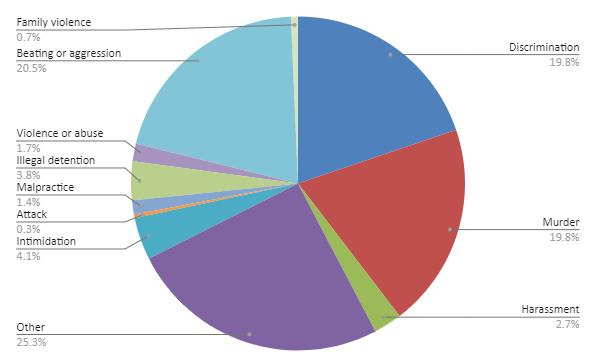
“STOP KILLING US” 2019-2020 REGIONAL REPORT
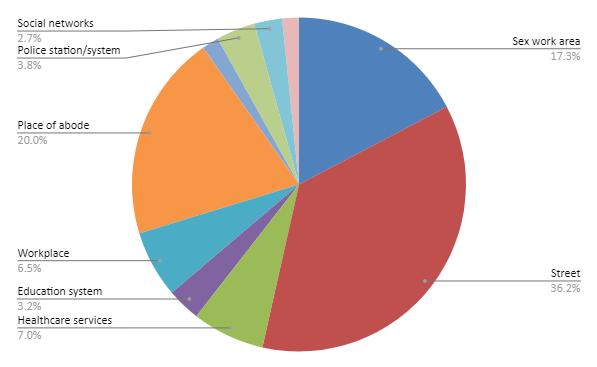
Even though street violence is more visible, it does not act as a deterrent for the perpetrators of violent acts. When matching such data with the figures for “perpetrators of violent acts”, almost 40% of these acts are carried out by people or groups vested with powers of force over the victims; i.e., law enforcement forces, military forces, private security companies and criminal groups. This evidences a high level of impunity; it is irrelevant whether these violent acts take place in the streets, what really matters is that these groups have the institutional endorsement or firepower, or both, to leave these acts unpunished.
The second place where most violent acts occur are private spaces; i.e., own house or workplace. There is a relationship between this information and the “perpetrators of violent acts” as 18% of the perpetrators are family members or clients.
As to whether victims file a report, this is a major challenge: trans women die and their identities are not legally recognized or they are not accompanied by their families. Hence, is it actually possible to collect real information based on the small number of reports made?
“STOP KILLING US” 2019-2020 REGIONAL REPORT
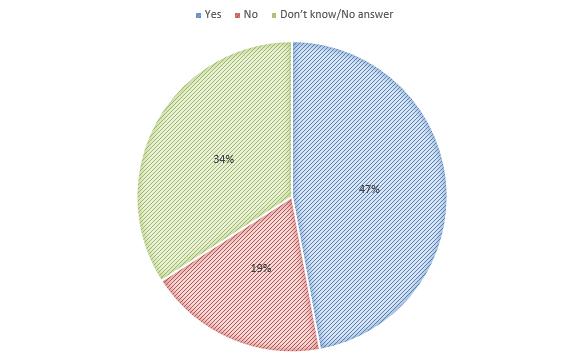
According to the following chart, the victims of human rights violations file a criminal complaint. This information is rendered null when we see that most cases are ignored (34.1%). There is no accurate information and trans persons who went to the different organizations to offer testimony of what they have suffered reveal that they do not go to the police station to file the report for fear of retaliation, revictimization or even of being wrongfully accused.
B. ACCESS TO EDUCATION
The compulsory education system implemented by democratic states should be secular since moral and religious mandates try to impose specific values that disregard gender or sexual diversity in violation of the right to education of transgender women and promote hate within the population.
The accounts and information collected by the NTROs agree that this situation is caused by the discrimination, violence and abuse suffered by transgender women in educational spheres due to the lack of government initiatives to implement specific gender- and diversity-based policies to address the different types of violence in school settings. The lack of family support is another cause; in many cases, dropouts go hand in hand with transgender women who are thrown out of their houses because they express their selfperceived gender identity.
“STOP KILLING US” 2019-2020 REGIONAL REPORT
From all the cases registered in CeDoSTALC, we found, as in prior reports, a high percentage of primary school dropouts.
The lack of public programs or policies to mitigate this situation is alarming. The lack of legal recognition of our identities affects and hinders access to education as part of the social, cultural, economic, political and environmental rights that have been historically violated.
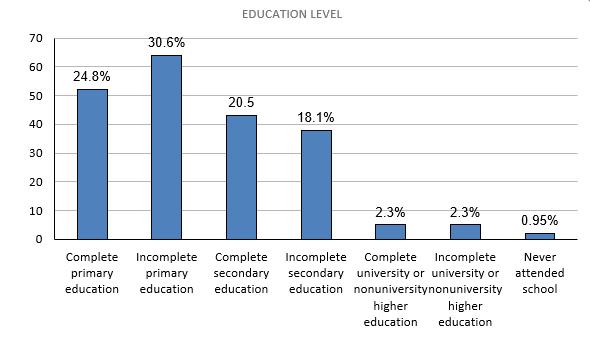
If states, among other factors, recognize the right to self-perceived gender identity for all transgender women, “lower dropout levels are registered as more transgender women have resumed their education and discrimination levels have dropped.” Therefore, recognizing the right to the gender identity of transgender persons is undoubtedly the key to guaranteeing any other right (REDLACTRANS, 2014).
C. ACCESS TO EMPLOYMENT
How can we discuss access to employment if there are no laws or programs to promote trans access?
As already mentioned, most trans women across the region engage in sex work to make a living. The analysis of this situation should also take into account the context: transgender people engaged in sex work are doubly stigmatized and discriminated not only for their gender identity but also for
“STOP KILLING US” 2019-2020 REGIONAL REPORT
their profession. This is mainly due to the fact that most countries of the region criminalize sex work and impose severe consequences to those “hunted” by institutional persecution and violence.
OCUPATION OF VICTIM
As shown in the chart, for 42% of the cases registered in CeDoSTALC, the outcome of this investigation is consistent with the accounts made by REDLACTRANS representatives in their public interventions and in the reports revealing the poverty and marginalization suffered by trans people.
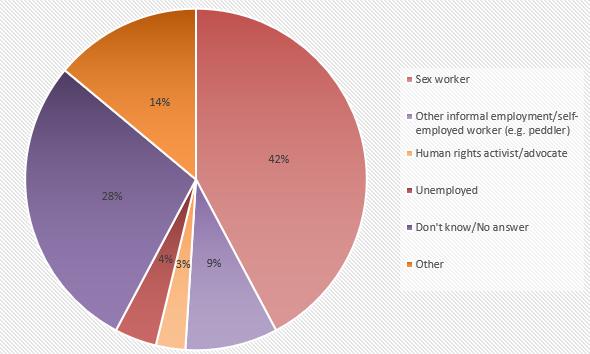
Depending on each country, the prejudices deeply rooted in our societies usually combined, depending on the territory, with the lack of IDs indicating the self-perceived gender identity of individuals lead to the conclusion that “access to registered employment is almost inexistent for transgender people” (REDLACTRANS, 2014).
For the few trans people that manage to get a job, maintaining it and moving up the career ladder is a complex situation with major similarities across countries. According to the accounts of REDLACTRANS representatives, “for some trans persons getting a job is a synonym of mutilation”, as in many cases trans persons are required to conceal their gender identity.
“STOP KILLING US” 2019-2020 REGIONAL REPORT
Self-employed work is also subject to social exclusion that affects different aspects of trans people’s lives. In summary, over the years, there were no indications of a state, political or social change that may improve access to employment for trans people. In Latin America and the Caribbean, transgender people’s right to work and to all their human rights are violated in a context of extreme violence unseen in other subpopulations. Historical and structural social exclusion can only be overcome through specific programs and legislation, such as those we demand every year.
D. ACCESS TO JUSTICE AND RIGHT TO INTEGRITY
As shown by the most atrocious crimes affecting the trans population of Latin America and the Caribbean, REDLACTRANS representatives decided to list the most brutal or notorious cases occurred in 2019-2020.
The following chart is an accurate reflection of the accounts of the violations of transgender rights across the region.
COUNTRY
ARGENTINA STATUS
On February 4, 2019, Laly Heredia was fatally shot three times in Camino de Cintura, Buenos Aires, by a client.
On July 18, 2019, Lucia Barrera, trans activist of Paraná, Entre Ríos, was stabbed to death 18 times in her house.
On November 26, 2019, "La Chicho" was brutally beaten and killed by a neighbor.
BARBADOS Hate crimes or crimes against trans people are not recognized in Barbados. Any case of physical violence, threats, harassment or malicious damage are regarded as such without considering the prejudice involved.
“STOP KILLING US” 2019-2020 REGIONAL REPORT
BELIZE
BOLIVIA Barbados’ national representative was attacked in February 2018 and her case concluded in April 2019. She was attacked by a former tenant who cut her face with a butcher’s knife. Despite the seriousness of the injuries and that it involved a dangerous citizen, he managed to avoid the police and run away. The attacker did not surrender to police and after being accused, he was released on bail. The case’s judge ordered compensation for BBD 460 (USD 230 for income lost as she could not work because she had to recover from the injuries) or 90 days in jail. The judge did not issue any ruling related to the event or the attack on the grounds of gender violence or the efforts made to evade justice.
During the health care emergency triggered by the COVID-19 pandemic, the lack of opportunities for trans people to access public funds or food and health assistance by the government became more evident.
The state, by failing to recognize the self-identity of trans people legally, commits the first violation of their human rights and the subsequent violation by requesting ID cards according to their gender to receive state support.
Gabriela Ramírez was stabbed to death 19 times in “Luz Bella” hostel in Villa Adela, El Alto City. The murder was given widespread coverage because her comrades demanded justice and security as it was not an isolated case but these cases have no visibility in Bolivia, let alone that city.
“STOP KILLING US” 2019-2020 REGIONAL REPORT
BRAZIL
COSTA RICA A case covered by the media was that of AM UM; she was battered in the sex trade area by the end of February 2020. Some people in a car harassed her and another trans women, beat her and recorded the events to upload them to the social networks.
Link to the news: https://www.crhoy.com/nacionales/videosujetos-atacaron-brutalmente-a-mujeres-transen-el-centro-de-san-jose/
Asociación Transvida monitored this case and provided advisory services to AM UM so that she would file a lawsuit.
In 2019, AM UM was killed while engaging in sex work. Means of communication referred to her using male pronouns disrespecting her gender identity.
Asociación Transvida issued a press release condemning the media.
Link: https://www.facebook.com/transvidacr/posts/13 08185905988409
LA QU was attacked with a sharp weapon in her domicile by a neighbor who had asked her to
The cases of violence against trans people in Brazil are terrible but the case of Dandara dos Santos is known as “the murder of cross-dresser Dandara Kettley” on February 15, 2017, who was beaten and killed by two shots in Bom Jardim, a neighborhood of Fortaleza, Ceará. The crime gained relevance when the images of the beating were published in the social media.
“STOP KILLING US” 2019-2020 REGIONAL REPORT
“party” with him in his room; she rejected the proposal and a few days later suffered the violent attack. The police arrived at the place but did nothing to help LA. She got a scar on her leg.
Asociación Transvida advised LA so that she would file a lawsuit but she refused.
We offered sensitivity training to law enforcement personnel to prevent this type of actions from happening but due to the COVID19 pandemic these workshops are suspended.
COSTA RICA MA CH was discriminated against by her boss and a colleague at her workplace for being a trans women. She filed a complaint with HR but was once again discriminated against.
We issued a communication on our social networks and sent an e-mail to the company and copied the Ombudsman's Office and the presidential commissioner requesting a positive answer. We also advised MA so that she would file a lawsuit.
Natasha Ruby Flores was killed by stabbing in her house on August 17, 2019, in Quito.
Catalina Casquete was tortured and killed in the street on April 25, 2019, in Durán.
Cristina Tobón was killed by her partner in her house on November 2, 2020, in Quito.
EL SALVADOR The case of Camila Díaz Córdoba highlights the negligence lived within the judicial system characterized by misogyny and ignorance of the law by public officers such as judges, district
“STOP KILLING US” 2019-2020 REGIONAL REPORT
GUATEMALA
HAITI
HONDURAS attorneys and lawyers that fail to implement the tools created under the reform to the Criminal Procedural Code, articles 129 and 155, that condemns hate crimes against vulnerable groups to over 50 years in prison. This shows the lack of institutional interest since the attackers that killed Camila Díaz Córdova were police members whose motto is “to serve and protect” and they did exactly the opposite. They were not tried according to these reforms because it was not titled as a hate crime but rather as a voluntary manslaughter even though evidence showed exactly the opposite.
Maris Bell Duarte was 15 years old and was shot dead on November 12, 2019, behind a church.
Luisa Reyes was found dismembered and with signs of torture and violence on April 1, 2020, in Izabal department. This department has become the most dangerous place to live for trans women.
Unfortunately, hate crimes against transgender women are very common and frequent but they are not reported so they go unpunished. We have recently created a direct suicide prevention line for the LGBT community, which has allowed us to record hate crimes. On September 3, 2020, a trans girl was reported missing; we notified the police but the case is still open and the girl is still missing.
On July 8, 2019, Bessy lainez was killed in the capital of Honduras. The killers were captured that same morning but they were not tried because proceedings take place two years after the arrest.
“STOP KILLING US” 2019-2020 REGIONAL REPORT
MEXICO
NICARAGUA
PANAMA Maria Avila was killed in 2018 in the City of Progreso Yoro. The trial took place on October 8, 2020, and the perpetrators admitted to the crime but were sentenced to 20 years. They are two young persons from the same city.
Karla Valentina Camarena del Castillo, Coordinator of the Mexican Network of Trans Women in Guanajuato State was killed on March 29, 2020, during strict quarantine. The Mexican digital newspaper Periodismo y Opinión Pública reads as follows: “The shooting to death of a transgender activist evidences another sector that will be left defenseless when the streets are emptied due to the COVID-19 crisis.” The cases of violence and hate crimes against transgender people show the lack of “tolerance” towards our community. A leading case was a trans women assaulted by 3 men. Her partner intervened, which heightened violence. The aggressors killed her partner and she was injured while escaping.
Yineth Múñoz case, testimony: “With gender restrictions (permission to leave the house during specific days based on gender) due to the pandemic, I went out a day allowed for women as I am a trans women. I went to the supermarket and the security guard told me that I couldn’t be there because I was a man so they would call the police. I had to leave because I was humiliated and felt terribly bad.”
Danna case, testimony: “I went to the supermarket one day during the pandemic when there were gender restrictions in place. I went out a day that was allowed for women as I am a trans women, I even changed
“STOP KILLING US” 2019-2020 REGIONAL REPORT
PARAGUAY
PERU my name in my ID. When I was at the pharmacy a security guard asked for my ID because a women who was at the supermarket told her that I was a man. I showed him my ID detailing my legally changed name. He apologized and I was able to continue shopping.”
Pamela Rodríguez case, testimony: “I am a 26-year-old trans woman. As I need money, I had to work the streets. Two police officers approached me in a motorcycle when I was at a corner and told me that I had to leave because only men could go out. I explained them that I was in my permitted hour to be in the street and that I am also picked on when women are allowed to go out. One of the police officers got mad and pepper sprayed me. When I took my cellphone to record the situation he got even madder and pressed the taser against my breast, hurting me. I ran away as I could.” There are four hate crime cases that were taken to oral proceedings, so one of the cases has a maximum sentence of 25 years. This set a major precedent as it is the first hate crime conviction against Blas Enrique Amarilla, charged with the murder of Romina Vargas, a trans women, that became final. (https://www.ultimahora.com/sentenciaasesinato-romina-vargas-quedo-firmen2887376.html )
Already 5 trans women were killed in Peru in 2020, although this figure refers not to all crimes committed across the country but rather to the identified cases. As there is no legal framework to protect victims, the features that may be identified as prejudice against victims (malice
“STOP KILLING US” 2019-2020 REGIONAL REPORT
and homophobic or transphobic insults before a crime) are disregarded and these hate crimes are investigated as voluntary manslaughter. These are the transfemicides committed in 2020 to date:
1. February 9, Lima (Villa El Salvador) Angie Mimbela del Águila (28) was slit her throat while working early in the morning. She agonized for 45 minutes as Serenazgo personnel refused to help her. Femicide perpetrator: unknown 2. July 11, Trujillo (El Porvenir) Cristal Romero Mattos (52) was beaten and stabbed to death. Femicide perpetrator: unknown 3. August 31, Lima (San Juan de Lurigancho) Brenda Venegas Ayquipa (52) was hanged; her body was found on August 4. Femicide perpetrator: Ivan Alexander Timaná Ángel (23), unaccounted for. Gabriela Cruz Pimentel (46) was recently killed on September 4 in the room rented in the district of San Miguel (Lima). She was found with her hands tied back and a cloth in her mouth so her murder was classified as a hate crime motivated by gender identity as she was tortured before she was killed.
DOMINICAN REPUBLIC A case that shocked the entire trans community was the case of Rubí Sodi from La Romana, who was dismembered and found in a uninhabited area of such province. Only her arms, legs and then her hear were found while the remainder parts of her body are still missing. The murder created unease in the entire trans community given the malice with which our identities are violated. Claims were filed with the ministries of La Romana and Santo Domingo, where the cases remain uninvestigated.


